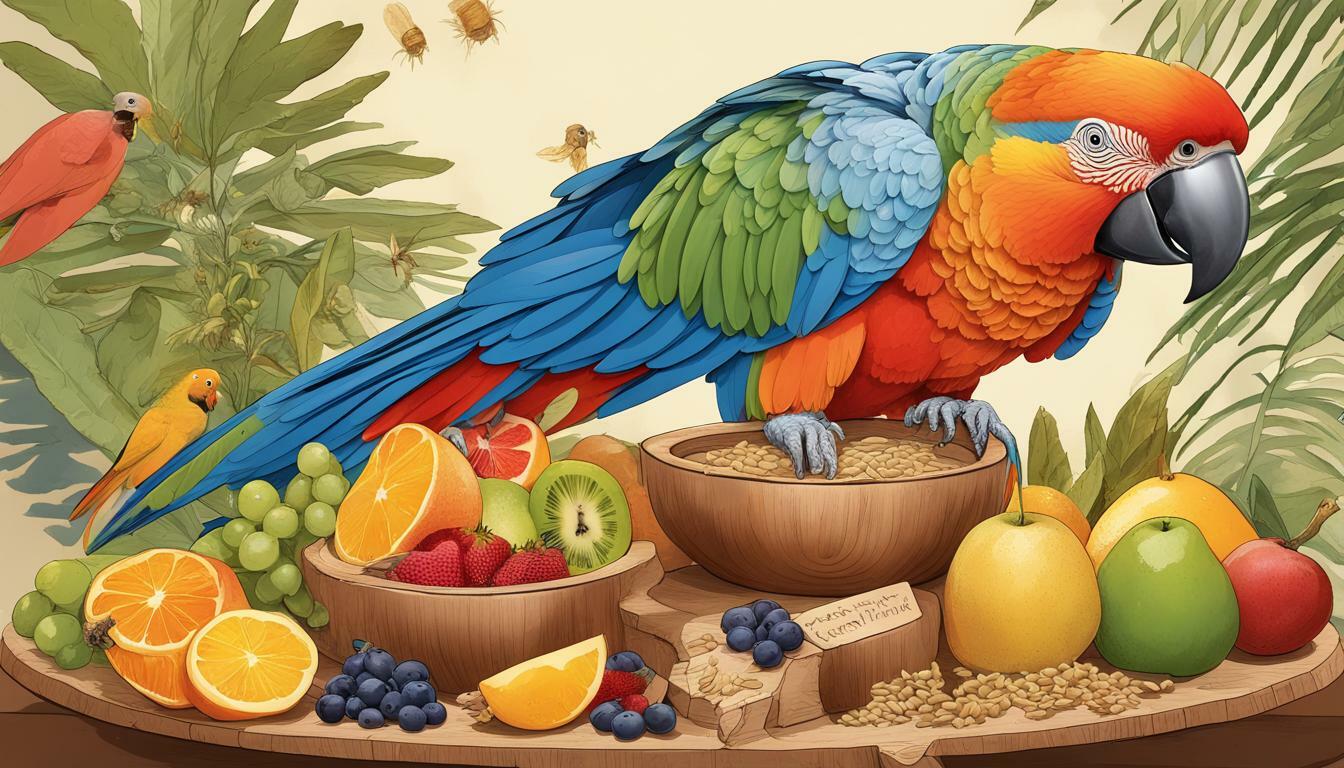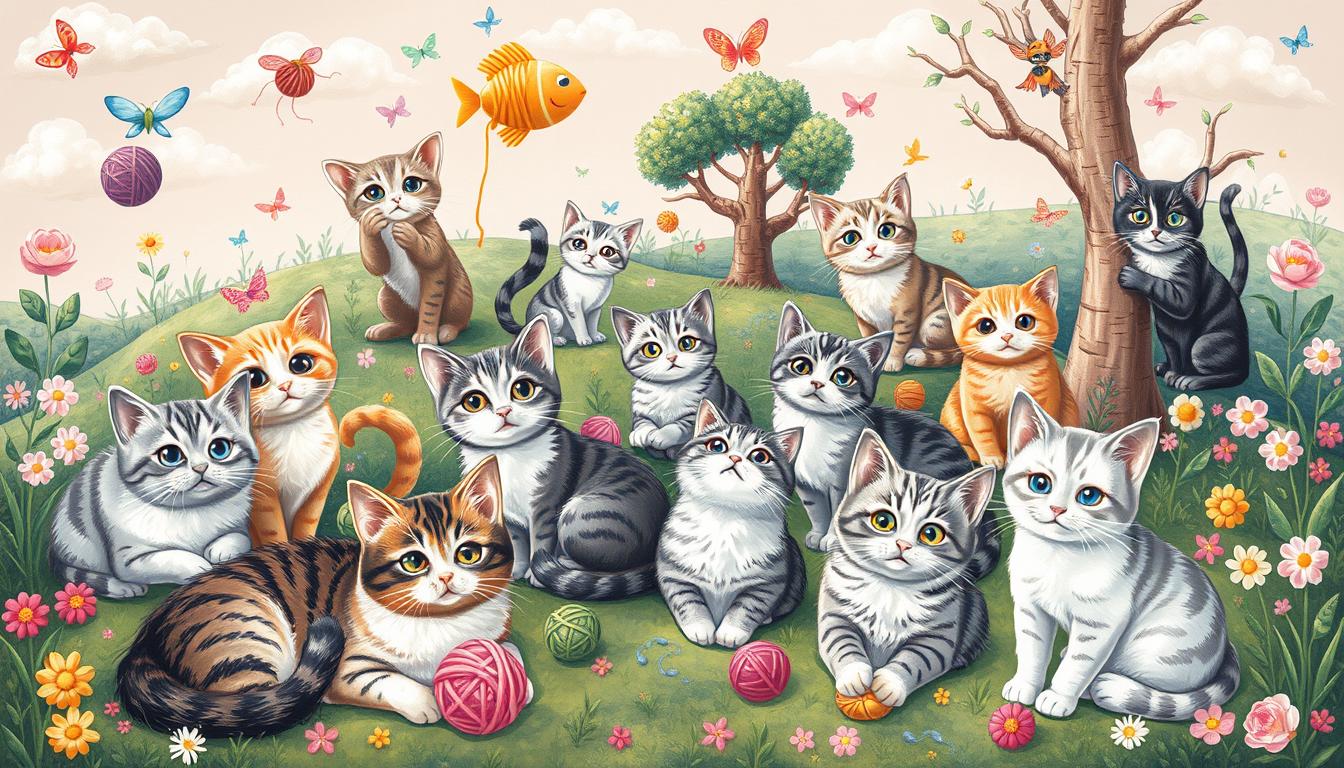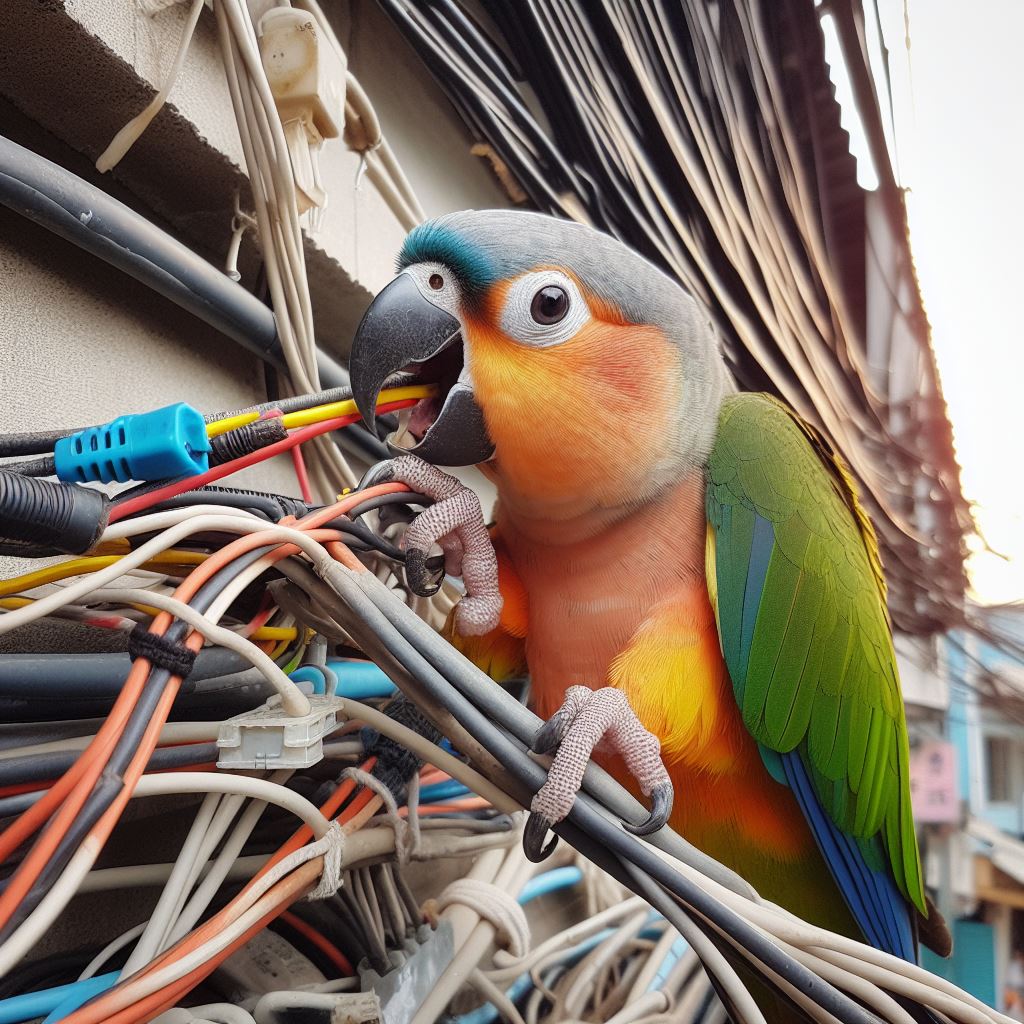Can Parrots Eat Honey? Your Guide to Avian Diets

Table of content:
Honey is a popular natural sweetener that humans love to use in foods, drinks, remedies, and more. But is honey something our pet birds like parrots and parakeets should be eating? Let’s take a closer look at the implications of feeding birds honey and whether it’s safe or unsafe.
Is Honey Good or Bad for Parrots?
This is the big question many parrot owners have: Can parrots have honey? The short answer is yes, parrots can eat honey in very small amounts as an occasional treat. However, honey should not be a regular part of a parrot’s diet.
Honey contains natural sugars and some beneficial nutrients. But it also carries potential risks, especially when over-consumed. moderation is key when offering honey to pet birds.
Here are some factors to consider regarding honey and parrots:
Nutritional Value
- Honey provides carbohydrates in the form of natural sugars. This can offer a quick energy boost.
- It also contains trace amounts of nutrients like antioxidants, enzymes, amino acids, vitamins, and minerals.
- However, the nutrient levels are quite low compared to fruits, veggies, pellets, and other staple foods.
Health Benefits
- The antioxidants in raw, unfiltered honey have antimicrobial and anti-inflammatory properties that support immunity and overall health.
- Some people use honey to soothe sore throats or suppress coughs due to its coating effects. Similar benefits are possible in parrots.
- Because of its unique enzymes and prebiotics, honey may also aid parrot digestion when consumed in moderation.
Potential Risks
- The main component of honey is sugar, which can cause obesity, diabetes, fatty liver disease, and other problems when over-consumed.
- Sticky honey can lead to a very messy situation in feathers and cage surroundings that requires diligent clean-up.
- There is a risk of bacterial contamination in raw honey, especially Clostridium botulinum which causes infant botulism in very young parrots.
Dental and Behavior Concerns
- The natural sugars in honey can lead to tooth decay and dental problems in parrots if fed excessively.
- Feeding honey by hand can encourage aggressive behavior like lunging or biting as parrots seek out the sweet treat.
- Honey is very high in calories and can reduce a parrot’s appetite for balanced meals and lead to nutritional deficiencies.
So while honey can offer some benefits, it also requires careful moderation and monitoring to avoid health problems when feeding it to parrots. Most avian vets and experts recommend limiting honey intake.
How Much Honey Can Parrots Eat Safely?
When feeding honey to parrots, only tiny amounts should be offered infrequently. Here are some general guidelines:
- Large parrots like macaws can have 1/2 teaspoon of honey 1-2 times per week at most.
- Medium parrots like conures or cockatiels should only have 1/4 teaspoon given as a treat once weekly.
- Small parakeets can have an eighth of a teaspoon a couple times a month at most.
- Baby parrots should avoid honey until 1 year old due to botulism risks.
- Always dilute honey in water if possible to decrease viscosity and stickiness.
- Choose raw, local honey when possible and inspect for signs of spoilage. Discard if any mold, odd smells, etc.
- Introduce honey slowly in tiny amounts to watch for signs of allergies or intolerances.
- Never feed directly from the honey jar or leave honey out where birds can access it. This prevents bacterial contamination.
- Monitor weight and behavior closely when offering honey treats. Discontinue use if any negative changes occur.
Focus on a balanced diet, and limit honey to occasional light seasoning for already healthy parrots to stay safest. Never use honey as a diet staple or daily treat.
Using Honey for Training Rewards
Some parrot owners wonder if honey is a good option for use as a training treat or reward. Using honey in clicker training or other reinforcement methods requires some safety precautions:
- Only use raw, unfiltered honey to decrease contaminants – never processed or artificial honey products.
- Have clean spoons handy to dollop tiny honey amounts to avoid spreading bacteria from the parrot’s beak to the honey jar.
- Proceed slowly with very small honey amounts and discontinue if parrot seems overly excited or aggressive from sugar.
- Monitor parrot’s food intake to ensure balanced diet is still being consumed and honey is not replacing nutritious foods.
- Weigh parrot frequently to avoid obesity from excess treat calories.
- Brush parrot’s beak after honey to remove stickiness that could end up on feathers or toys.
- Ensure plenty of fresh water is available for rinsing.
- Use other healthy training treats in addition to honey for variety and balanced nutrition. Good options include seeds, nuts, fresh fruits, and veggies.
With careful precautions, a bit of honey can be an effective positive reinforcement for desired behaviors in parrot training. But moderation and supervision are crucial to prevent overconsumption and associated health risks.
Can Parrots Eat Honey Sticks?
Some parrot owners offer honey sticks as toys or foraging activities. However, these processed honey products carry higher risks and are not recommended by vets. Reasons to avoid honey sticks for parrots include:
- The honey is extremely viscous and sticky, coating beaks and feathers.
- Bottle brushes spread contaminants as parrots chew.
- Honey sticks designed for hummingbirds often contain artificial additives and excess iron that is unhealthy for parrots.
- The honey delivery method allows for over-consumption of large honey amounts very quickly.
- Plastic components present a choking hazard and can cause crop impactions if swallowed.
For parrots, homemade foraging toys with objects to shred and extract small pieces of raw honey are safer than pre-made honey sticks from the store. But as always, use any honey products sparingly and under supervision.
Can Birds Have Too Much Honey?
Yes, parrots can absolutely have too much honey, even of the raw, natural kind. Consuming honey in excess contributes to obesity, nutritional imbalance, crop infections, fatty liver disease, and potential toxicity.
To keep parrots healthy, honey should be limited to no more than 2-3 very small servings monthly for most birds. Anything beyond this amount is considered overconsumption given honey’s dense calorie content and composition which is over 80 percent sugar.
Make honey an occasional light seasoning, not a dietary staple. Focus on quality pellets, produce, proteins, nuts, and seeds instead to meet a parrot’s nutritional needs. Honey is not a necessary food item, so err on the side of caution when treating.
Signs of Honey Overdose to Watch For
Parrot owners should watch for these signs that indicate a bird has consumed too much honey:
- Increased lethargy, weakness
- Refusal to eat regular foods
- Crop swelling or regurgitation
- Disinterest in social interaction
- Fluffed, plucked feathers
- Weight gain
- Sticky beak area and feathers
- Diarrhea
- Stool or vomit containing honey
- Irritability or aggression
- Self-mutilation behaviors
- Seizures in severe cases
If any of these honey overdose symptoms appear, call your avian vet right away as it can become a life-threatening emergency. Prompt treatment will give your parrot the best chance of recovery.
Prevention is best – be very conservative with honey amounts and never leave honey unattended where your parrot can access it. Moderation and supervision are key to safety.
Making Your Own Parrot-Safe Honey Treats
Want to prepare homemade honey treats to offer your parrots? Here are some healthy recipes to try that provide portion control:
Parrot Honey Bites
- 1/4 cup raw organic honey
- 1 cup natural grain cereal
- 1/3 cup chopped nuts
- Optional: 1 tsp cinnamon powder
Instructions: Mix all ingredients in a bowl until a sticky dough forms. Roll into bite-sized balls and let parrots nibble these mini treats. Refrigerate any leftovers. Provides at least 12 honey bites.
Fruit & Honey Chops
- Assorted chopped fruits like apples, berries, melon
- 1-2 tsp raw honey
- Chia seeds or chopped nuts (optional protein boost)
Instructions: Chop fruits into bird-sized pieces. Add honey and gently toss to coat. Sprinkle with seeds or nuts if desired. The natural sugars in the fruits complement the honey nicely.
Honey Nut Beak Treats
- 2 tbsp natural peanut or almond butter
- 1 tsp raw honey
- 1 tbsp finely chopped nuts
- 1/4 cup toasted oat flour
Instructions: Mix all ingredients together until a thick, sticky paste forms. Spread paste thinly onto a baking sheet and cut into strips. Bake 10 minutes at 350F to harden. Let parrots nibble these crunchy, nutritious beak treats.
Follow proper honey safety and hygiene practices when making homemade bird treats. Use extremely sparingly, and discontinue use if any negative symptoms appear.
FAQs on Parrots and Honey
Many parrot owners have questions about adding this popular human food to their bird’s diet. Here are answers to some of the most common queries:
Can Parrots Have Honey?
Yes, parrots can eat honey. Honey was a part of some parrot species’ natural diets in the wild. But pet parrots have a more restricted diet and less ability to burn excess calories, so honey should be limited.
Is Honey Safe for Parrots?
In very small amounts, honey is generally safe for healthy parrots. But it carries risks when fed frequently or in large quantities including nutritional imbalances, obesity, dental issues, and potentially life-threatening botulism. Parrot owners should exercise caution when feeding honey.
What Does Honey Do to Parrots?
The natural sugar in honey provides a quick energy boost but can also cause blood sugar spikes. The nutrients and enzymes offer some benefits, and the taste appeals to parrots’ natural sweet tooth. But excess honey can also negatively impact health, digestion, and behavior when over-consumed. Moderation is crucial.
Should I Give My Parrot Honey?
Occasional tasting of honey is fine for most parrots, but it should not be a dietary staple. No more than 1-2 times per week in tiny amounts. Consider honey an infrequent treat, not a daily food source. Focus on a balanced diet with pellets, fruits, veggies, seeds, nuts, and healthy proteins first.
Can I Feed My Parrot Honey?
You can feed honey to your parrot in very limited amounts. No more than 1/2 teaspoon once or twice a week is appropriate for medium sized parrots. Smaller birds need even less. Feed it from a spoon, never directly from the jar/container to avoid bacterial contamination.
Is Honey Healthy for Parrots?
Raw, unfiltered honey does provide trace amounts of antioxidants, enzymes, and nutrients that support parrot health. But the high sugar content is unhealthy in large amounts. Overall, the risks outweigh the small benefits for parrots when fed regularly.
Do Parrots Like the Taste of Honey?
Most parrots love the sweet taste of honey and will readily accept it. This natural craving for sugar helped wild parrots seek out ripe fruits and flower nectar. But as pets, parrots no longer need as much energy from sugars. The taste can still be offered in moderation as an occasional treat.
Will Honey Hurt My Parrot?
Overfeeding honey can definitely hurt parrots by causing weight gain, fatty liver disease, nutritional imbalance, crop infections, tooth decay, and other problems. But an occasional small taste is fine for most birds. Always monitor your parrot’s health with regular vet checkups.
Can Honey Make a Parrot Sick?
Yes, honey can potentially make parrots sick if they consume spoiled honey containing toxins from bacteria like Clostridium botulinum. Young birds are at highest risk. Honey fermenting in the crop can also cause illness. Any sudden changes in behavior, appetite, droppings after eating honey warrant an immediate vet visit.
Is Honey Bad for Parrots?
Honey is not inherently bad for parrots. But the risks of overconsumption and bacterial contamination mean it should only be fed in extreme moderation. Focus on balanced nutrition from a quality pellet diet, fruits, veggies, and healthy proteins instead. Check with your avian vet before feeding honey.
Final Thoughts on Parrots and Honey
To summarize, honey can be part of a parrot’s occasional treat regimen when used carefully and conservatively. But it should never become a dietary staple due to potential health risks from its sugar content. Focus on quality pellets, produce, and proteins for your parrot’s main nutrition.
Always inspect honey carefully for contamination and dilute it prior to feeding parrots. Offer very small serving sizes no more than 1-2 times per week at most for larger birds, and less for smaller parrots. Monitor for any negative symptoms and discontinue use if they appear.
While many parrots relish the sweet flavor of honey, their limited digestive systems are not equipped to handle it regularly. Use honey sparingly as a light seasoning, not a daily food item. A nutritious pellet-based diet with ample fruits, veggies, and lean proteins is ideal for your feathered friend’s needs. With some safety precautions, an occasional honey treat can be enjoyed – but moderation is key to your parrot’s health and happiness.
Welcome. I’m Adreena Shanum, the proud owner of this website, and I am incredibly passionate about animals, especially poultry. I founded adreenapets.com as a labor of love, stemming from my desire to share my knowledge and experiences with poultry enthusiasts worldwide.




